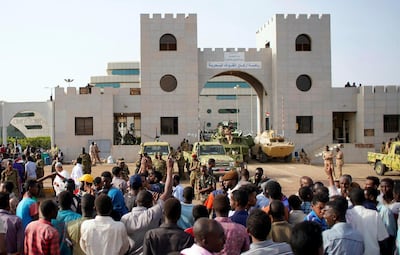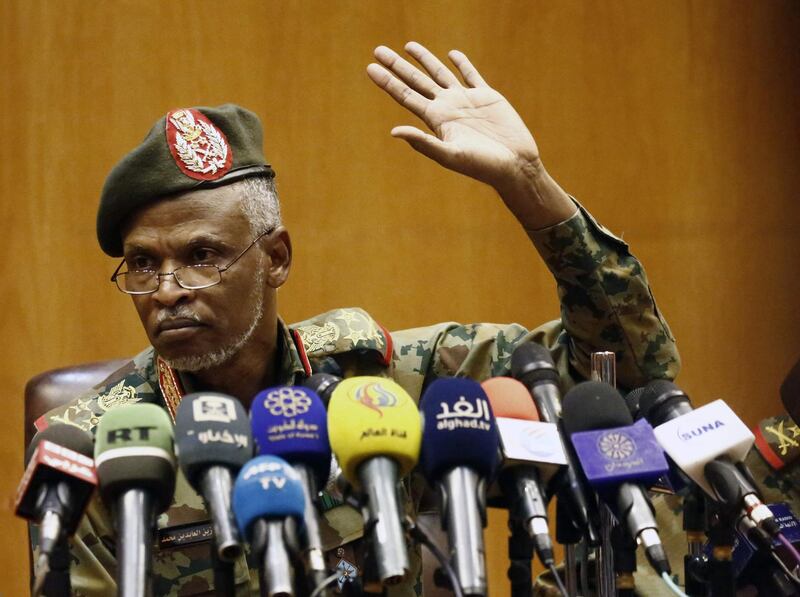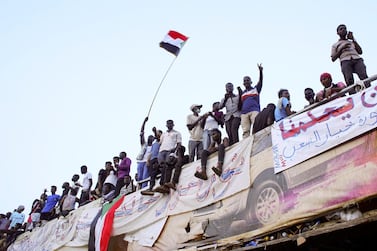Sudan's ruling military council promised on Friday that the country would have a new civilian government as protesters continued to surround the defence ministry compound despite the removal of President Omar Al Bashir by the armed forces.
The council, which is now running Sudan under Defence Minister Mohammed Ahmed Awad Ibn Auf, said the two-year pre-election transition period it announced on Thursday after deposing Mr Al Bashir could be much shorter if the country avoided chaos.
The council also said it would not extradite Mr Al Bashir to face allegations of genocide at the International Criminal Court and that the former leader would be tried in Sudan instead.
Friday's statements by the head of the council's political committee, Gen Omar Zain Al Abideen, appeared aimed at reassuring demonstrators who took to the streets to warn against imposing army rule after Mr Al Bashir's overthrow.
Gen Abideen pledged that the military council would not interfere with the civilian government. However he said the defence and interior ministries would be under the council's control.
He said the military council had no solutions to Sudan's crisis and these would come from the protesters.
"We are the protectors of the demands of the people," he said. "We are not greedy for power."
Thousands of Sudanese demonstrators defied an overnight curfew to camp outside the defence ministry and press their demand for a civilian government. Activists called for mass prayers outside the ministry on Friday.
The demonstrators, who have been holding almost daily anti-Bashir protests, rejected the decision to set up a transitional military council and vowed to continue protests until a civilian government is installed.
After the military council's statement on Friday, the Sudanese Professionals Association that has been leading the protests called for Mr Al Bashir to be handed over for trial by the International Criminal Court, saying they had doubts about Sudan's judiciary, and for an independent inquiry into the shooting of protesters, Sky News Arabia reported.
تجمع المهنيين السوداني: جرائم الحرب المتهم بها الرئيس البشير يجب أن يحاكم عليها أمام محكمة الجنائية الدولية وليس أمام القضاء المحلي
— سكاي نيوز عربية-عاجل (@SkyNewsArabia_B) April 12, 2019
تجمع المهنيين السوداني يدعو لتشكيل لجنة تحقيق مستقلة بشأن إطلاق النار على المعتصمين
— سكاي نيوز عربية-عاجل (@SkyNewsArabia_B) April 12, 2019
Large tents were put up outside the compound and people brought food and handed out water as the crowd swelled, witnesses told Reuters. Ahmed Al Sadek, a 39-year-old trader, said he had not slept at his home since the sit-in began last Saturday.
Activists wearing yellow vests controlled traffic around the compound on Friday morning and managed foot traffic to and from the sit-in. They also blocked a major bridge in central Khartoum.

Mr Al Bashir, 75, was removed from office on Thursday after 16 weeks of demonstrations against him, ending his three decades of rule following a military coup in 1989.
World powers, including the United States and Britain, welcomed his removal but called for a peaceful and democratic transition sooner than the two years set by the military council.
Mr Ibn Auf is included on Washington’s list of Specially Designated Nationals for his role during the Darfur conflict, meaning all his assets in the US were frozen and Americans were banned from doing business with him, according to the US embassy.
He said on Thursday that Mr Al Bashir was being detained in a "safe place". Sudanese sources told Reuters that Bashir was at the presidential residence under "heavy guard".
The political committee will meet political parties and foreign diplomats during the course of Friday, state media reported.
Mr Ibn Auf on Thursday also announced a state of emergency, a nationwide ceasefire and the suspension of the constitution. He also said there would be a curfew from 10pm to 4am.
The main organiser of protests against Bashir, the Sudanese Professionals Association, rejected Mr Ibn Auf's statement and called on protesters to continue sit-in outside the defence ministry.
Several thousand protesters remained in front of the defence ministry compound, and in other parts of the capital, as the curfew went into effect. They chanted "They removed a thief and brought a thief!" and "Revolution! Revolution!"
Some shops in Omdurman, across the River Nile from central Khartoum, remained open past 10 p.m., a Reuters witness said.
Mr Al Bashir has been indicted by the International Criminal Court in The Hague and is facing an arrest warrant over allegations of genocide in Sudan's Darfur region during an insurgency that began in 2003 and led to the death of an estimated 300,000 people. He denies the allegations.
He was the second leader in the region to be forced out of office this month after mass demonstrations. Algeria's Abdelaziz Bouteflika, in power since 1999, stepped down on April 2 after six weeks of protests.






